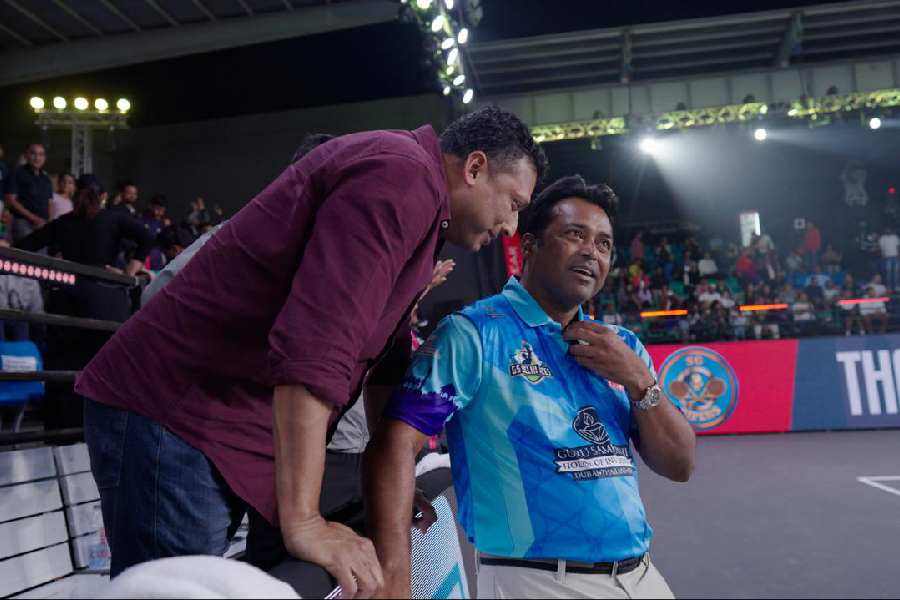 |
| Omar Abdullah at a media interaction in New Delhi. PTI file picture |
New Delhi, Jan. 14: Jammu and Kashmir chief minister Omar Abdullah is gambling with a makeover reshuffle in the middle of a winter of atypical disquiet over the Valley.
Scheduled for tomorrow, Omar’s cards-close-to-chest cabinet rejig could open two possibilities. It could infuse new blood in a government that has survived violent troughs but struggled to establish a credible mass connect. Or, it could trigger new disaffection if the old guard of the National Conference (NC) is sidelined, as many power observers have speculated.
There is, of course, a third outcome popularly presaged: that the Omar government has made itself so unpopular, no amount of cosmetics will put a new image on it.
The Congress is part of the coalition and may earn two new berths, but its prospects are a relatively inert part of the exercise, more to do with factional jockeying than with public impact.
The deep winter, or chilai kalan as it is locally known, is usually a period of weather-insulated, kangri-coddled recess from strife for Kashmiris. Snow blocks or restricts illicit movement across the LoC, and keeps most people marooned indoors or in their neighbourhoods. The cold also occasions sub-normal attendance in offices, businesses slip into semi-hibernation. The seat of government itself shifts to Jammu; provocation, or enthusiasm, for protest runs as low as the temperatures. Kashmir more often bucks the classical discontent maxim, it processes them through summers.
But as Omar rearranges the coalition jigsaw in Jammu, unseasonal drifts of anxiety in the Valley have riveted his attention. The murder of a sarpanch in Sopore has shivered several dozen of them to resign in panic and publicly seek the benevolence of shadowy operatives of the Lashkar-e-Toiba.
Some of them were flustered enough to have themselves photographed with resignations displayed across their chests so the message would go out that they had abandoned their “collaboration” with the government. Many more thousand sarpanchs are pressing the unfeasible demand for armed person-to-person protection.
Moderate Hurriyat leaders, recently returned from a trip to Pakistan, have invoked more ominous spectres than the Lashkar in their pursuit of a “final settlement” of the Kashmir issue.
In his first Friday address at Srinagar’s Jama Masjid upon arriving from Pakistan, Mirwaiz Umer Farooq warned of a Talibani run across Kashmir if a political solution was not fast-tracked.
Perhaps equally worrisome is a confrontation that has spiralled at a slight remove from the Valley — retaliatory ceasefire violations along the Poonch frontier following the ambush and murder of two Indian Army jawans, one of whom was alleged to have been decapitated by Pakistani soldiers.
Revenge and reprisal rhetoric has accompanied sporadic cross-border firing since then; its echoes have discomfited nerves in Kashmir. The Valley has become the field of battle in all wars India and Pakistan have fought; but for all their years of living accustomed to a “conflict zone”, the prospect of another descent into military confrontation is nothing Kashmiris look forward to.
“Every time there is talk of war, nerves get jangled in the Valley,” said Basheer Manzar, editor of the Srinagar daily Kashmir Images. “We have a long and troubled border, there are thousands of troops all over, the faintest possibility of it sets off anxious speculation and conspiracy mongering. The Valley border is not the theatre of the current confrontation, but it isn’t far and this is a fragile place, people get affected, if only psychologically.”
Omar flew unplanned to Srinagar yesterday for fresh stocktaking of the security situation in Kashmir, concerned both over the fresh fear among sarpanchs and any cascade-impact of border tensions in Poonch.
Sources told The Telegraph it wasn’t a full-complement meeting of the Unified Command Omar chaired, but key elements of the army, the paramilitary, police and intelligence were present. “The essential thrust was to conduct more area-domination exercises in sensitive pockets to restore public confidence and to sharpen ground intelligence,” a source said. “This is the kind of atmosphere in which agents provocateurs can flourish, even the most baseless rumour can create havoc. We need to be vigilant.”
The one assuring sign for the Valley administration in the context of renewed cross-border hostility is that trade posts in Kashmir haven’t been affected. The Command Post beyond Uri, a key commercial conduit, has reported normal trading operations three days a week.
Within the Valley itself, though, unease over the fate of sarpanchs may prove tough to contain. Those that have resigned remain a minuscule section of 38,000-odd elected village heads. But they are a vociferous lot and their remonstration has spurred public alarm. The government is in no position to create a security bubble around each sarpanch; it is, for the moment, inclined to draw solace from last year’s round of similar resignations, which were not eventually pressed by the sarpanchs.
But should more attacks follow, the government will feel pressed to do something demonstrable. Especially since it’s on the closing lap to a slew of elections. Urban local body and block development council polls are scheduled in a few months. Two critical tests await next year — Lok Sabha polls pre-summer and, immediately after, the Assembly election.
“It is with these political challenges in mind that the reshuffle has been planned,” a senior NC leader said. “Omar’s effort seems to be that some senior partymen should be relieved of ministerial responsibility so they can strengthen the organisation, something of a Kamraj Plan.”
Among the names being discussed as candidates for relocation out of government are finance minister Abdul Rahim Rather and rural development minister Ali Mohammed Sagar. Both are old NC hands, credited with influence over party cadre. But both are also widely seen as part of the “older set” that Omar was never able to build smooth equations with.
Whether they will see being assigned to party work as a reward or punishment is what may well determine how the NC fares in the Valley hereon.










